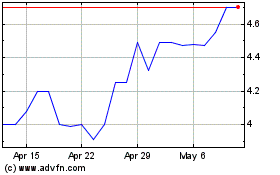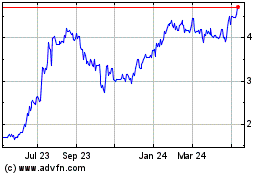Venezuelan Government Uses Bonds to Pay Settlement With Miner
August 16 2018 - 5:59AM
Dow Jones News
By Julie Wernau and Andrew Scurria
Venezuela has made a payment to a mining company using
government bonds instead of cash, potentially the first time it has
done so since U.S. sanctions last year barred similar
transactions.
The payment on Tuesday was made as creditors scramble to move in
on the remaining assets of a country that is already in widespread
default and enmeshed in an economic crisis. Last week a U.S. court
ruled that a creditor could seize Venezuela's biggest U.S. asset,
Citgo Petroleum Corp., causing alarm among bondholders who fear
collection efforts could disadvantage them.
Gold Reserve Inc., a miner incorporated in Canada and
headquartered in Spokane, Wash., said in a statement that it had
received Venezuelan government bonds with an estimated market value
of around $88.5 million. The payment was made as part of a
settlement agreement that calls for the Venezuelan government to
pay it around $1 billion related to a mining project in the
country. Venezuela's government debt is currently trading at
between 20 and 30 cents on the dollar.
Short on dollars and facing the sanctions imposed by the U.S.
last August, Venezuela has been constrained in efforts to raise
cash or pay down debt.
They were put in place after the asset-management arm of Goldman
Sachs Group Inc. purchased at a steep discount $2.8 billion in
Venezuelan bonds that had been held by the country's central bank.
The purchase drew criticism from opposition politicians in
Venezuela and some investors for supplying cash to authoritarian
President Nicolás Maduro.
"This money belongs to the Venezuelan people," President Donald
Trump said in a statement after ratcheting up sanctions he said
would prevent Venezuela from conducting "fire sales" that liquidate
Venezuelan assets.
Venezuela's National Assembly has similarly barred such
transactions, but Mr. Maduro effectively dissolved Congress last
year and replaced it with his own government. Investors say it is
unclear whether a reinstated Congress under another government
would honor bonds Mr. Maduro's regime has put into the market to
pay down debts.
The sanctions appeared to keep an estimated $3.5 billion in
bonds still owned by Venezuela from making their way to the market
-- until the payment of bonds to Gold Reserve.
"This is the first transaction in which the Venezuelan
government paid somebody with bonds since the sanctions," said
Francisco Rodriguez, chief economist at Torino Capital, a New
York-based investment bank.
The U.S. Treasury Department clarified last month that its
sanctions aim to block U.S. entities from participating in "corrupt
and shortsighted financing schemes" involving Venezuela selling off
government assets, including bonds, for less than they are
worth.
In the company's statement, President A. Doug Belanger said Gold
Reserve was "very pleased with the receipt of bonds" and that it
looks forward to working with Venezuela on a large, undeveloped
gold-copper project.
Despite the U.S. sanctions, companies can apply for and receive
an exemption to a sanction, but such licenses aren't made
public.
"The Treasury Department will issue specific licenses allowing
collections of past debts that would otherwise be prohibited by
sanctions as long as the debt was incurred before that sanction,"
said Peter Harrell, a consultant on economic sanctions who oversaw
Iran sanctions under the Obama administration.
The bonds transferred to Gold Reserve are on a list of bonds the
U.S. government has licensed to trade, according to a person
familiar with the matter.
Officials at the U.S. Treasury and Global Affairs Canada didn't
comment.
Gold Reserve is one of several creditors that have won large
arbitration judgments against Venezuela. Defunct Canadian gold
miner Crystallex International Corp. won a U.S. court ruling last
week authorizing its seizure of Citgo, the U.S. oil refiner owned
by Venezuela's state oil company, to satisfy a $1.4 billion
award.
Venezuela had reached a settlement with Crystallex last year to
end its pursuit of Citgo, according to Canadian court documents.
Crystallex was paid at least $25 million in cash before Venezuela
lapsed on additional required payments, scuttling the agreement.
Citgo's owner, Petróleos de Venezuela SA, has said it would
challenge the potential seizure in a U.S. appeals court.
Already hobbled Venezuelan bonds fell to a two-year low
following the Citgo ruling. Investors holding defaulted Venezuela
bonds have expressed alarm that such rulings or bond payments by
Venezuela could disadvantage the country's other creditors.
Venezuela and its various state-controlled entities together
have $62 billion of unsecured bonds outstanding, with approximately
$5 billion so far in unpaid interest and principal. Analysts
estimate that the government has approximately $150 billion total
in debt outstanding to creditors around the world.
Write to Julie Wernau at Julie.Wernau@wsj.com and Andrew Scurria
at Andrew.Scurria@wsj.com
(END) Dow Jones Newswires
August 16, 2018 05:44 ET (09:44 GMT)
Copyright (c) 2018 Dow Jones & Company, Inc.
Gold Reserve (TSXV:GRZ)
Historical Stock Chart
From Mar 2024 to Apr 2024

Gold Reserve (TSXV:GRZ)
Historical Stock Chart
From Apr 2023 to Apr 2024
